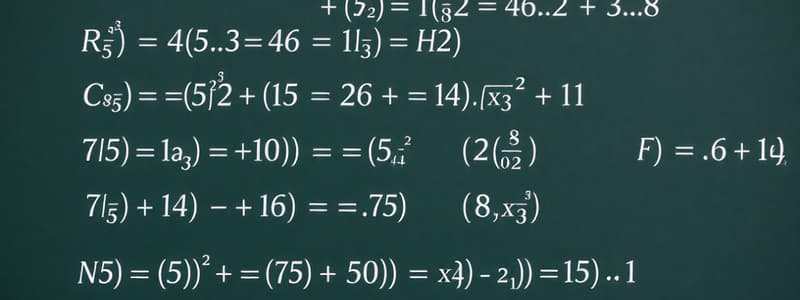Podcast
Questions and Answers
Which of the following students correctly represented y as a function of x?
Which of the following students correctly represented y as a function of x?
- Stephanie
- Deshaun
- Orlando
- Nathan (correct)
Which student’s work likely illustrates a non-function based on their data?
Which student’s work likely illustrates a non-function based on their data?
- Charlotte
- Colby
- Deshaun
- Stephanie (correct)
Which representation would confirm a non-function when analyzing the inputs and outputs?
Which representation would confirm a non-function when analyzing the inputs and outputs?
- Nathan's table
- Deshaun's coordinate collection
- Stephanie's table (correct)
- Sofia's diagram
What characteristic distinguishes a set of points as a function?
What characteristic distinguishes a set of points as a function?
When students circled names of those who displayed proper function representation, which name would logically be included?
When students circled names of those who displayed proper function representation, which name would logically be included?
What does it mean for a vending machine to represent a function?
What does it mean for a vending machine to represent a function?
In the set of ordered pairs {(3, 7), (4, 7), (5, 7), (6, 7)}, does y represent a function of x?
In the set of ordered pairs {(3, 7), (4, 7), (5, 7), (6, 7)}, does y represent a function of x?
Which representation would NOT be considered a function?
Which representation would NOT be considered a function?
How can a graph pass the vertical line test?
How can a graph pass the vertical line test?
If Nate inputs B2 into the vending machine, which item will he receive?
If Nate inputs B2 into the vending machine, which item will he receive?
Which of these sets of ordered pairs does NOT represent a function?
Which of these sets of ordered pairs does NOT represent a function?
If the next customer after Mia inputs A2 and receives milk instead of orange juice, what can be concluded?
If the next customer after Mia inputs A2 and receives milk instead of orange juice, what can be concluded?
Flashcards are hidden until you start studying
Study Notes
Identifying Functions
- A vending machine is a function as long as each selection has only one output
- It is still a function if a selection has the same outputs for every input
- If a selection has different outputs for the same input then it is not a function.
- A function is when one input maps to only one output.
- If the vertical line test is passed on the graph of a function, it means that a vertical line drawn on the graph will pass through only one point.
- Each input value in a table is connected to only one output value in a function.
- A set of ordered pairs is considered a function if no input is repeated with different output values.
- A function will not have an arrow pointing toward the same output for a repeated input on an arrow diagram.
- In a scatter graph, each point should only have one y-value for every x-value.
- A missing x-value in a set of ordered pairs will not be considered a function if the x-value is the same value used for a different y-value
- To make a list of ordered pairs a function, the missing x-value should be a number not used in the set yet
- To make a list of ordered pairs NOT a function, the missing x-value should be a number already used in the set paired with a different y-value.
Non-Examples
- A function is when one input maps to only one output.
- If the vertical line test is passed on the graph of a function, it means that a vertical line drawn on the graph will pass through only one point.
- Each input value in a table is connected to only one output value in a function.
- A set of ordered pairs is considered a function if no input is repeated with different output values.
- A function will not have an arrow pointing toward the same output for a repeated input on an arrow diagram.
- In a scatter graph, each point should only have one y-value for every x-value.
- A missing x-value in a set of ordered pairs will not be considered a function if the x-value is the same value used for a different y-value
- To make a list of ordered pairs NOT a function, the missing x-value should be a number already used in the set paired with a different y-value
Homework
- Charlotte's scatter plot shows a function because each input is only connected to one output.
- Jace's arrow diagram demonstrates a function because each input only goes to one output.
- Nathan created a table that demonstrates a function because each input value only has one output value.
- Orlando's list of ordered pairs represents a function because no input is repeated with a different output value.
- The letters that spell "Four" are in alphabetical order.
Studying That Suits You
Use AI to generate personalized quizzes and flashcards to suit your learning preferences.




